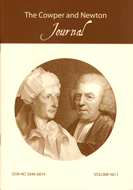Critical Writing on William Cowper, 2013–2014
Ashley Chantler
Periodical Articles, Essays, Notes
Buie, Diane, ‘William Cowper: A Religious Melancholic?’, Journal for Eighteenth-Century Studies, 36.1 (2013), 103-119.
Chantler, Ashley, ‘Critical Writing on William Cowper, 2011–2012’ and ‘Additions to “Critical Writing on William Cowper, 1980–2010”’, Cowper and Newton Journal, 3 (2013), 50-52.
Clucas, Tom, ‘Editing Milton During the French Revolution: Cowper and Hayley as “brother Editor[s]”’, Review of English Studies, 65.272 (2014), 866–87.
Gee, Lisa, ‘“William the Conqueror”: The Friendship Between William Hayley and William Cowper’, Cowper and Newton Journal, 3 (2013), 31-49.
Hutchings, W. B., ‘William Cowper, “Hope”, Lines 75-210’, Cowper and Newton Journal, 3 (2013), 23-30.
Hutchings, W. B., ‘On the Loss of the Royal George’, Cowper and Newton Journal, 4 (2014), 38
Keyner, Thomas, and John D. Baird, ‘Cowper’s “Light Propitious”’, Notes and Queries, 60.1 (2013), 110-11.
Koehler, Martha J., ‘Sincerity and Dread in William Cowper’s Conversion Narratives’, Cowper and Newton Journal, 4 (2014), 3-33.
Newey, Vincent, ‘Cowper’s Task: An Unexpected Reference’, Cowper and Newton Journal, 4 (2014), 34-37.
Newey, Vincent, ‘Editions of the Writings of William Cowper: An Annotated Bibliography 1960–2013’, Cowper and Newton Journal, 4 (2014), 46-48.
Parker, Erin, ‘“Doubt not an affectionate host”: Cowper’s Hares and the Hospitality of Eighteenth-Century Pet Keeping’, Eighteenth-Century Life, 38.2 (2014), 75-104.
Rignall, John, ‘Cowper’s Importance to George Eliot’, Cowper and Newton Journal, 3 (2013), 17-22.
Seward, Tony, ‘William Cowper and the Material World’, Cowper and Newton Journal, 3 (2013), 3-16.
Spooner, Emma, ‘I Sing of the Sofa, of Cucumbers, and of Fanny Price: Mansfield Park and The Task; Or, Why Fanny Price Is a Cucumber’, Persuasions: The Jane Austen Journal, 35.1 (2014), online.
Books and Chapters
Andrews, Kerri, ‘“No more than as an atom ’mid the vast profound”: Conceptions of Time in the Poetry of William Cowper, William Wordsworth, and Ann Yearsley’, in Class and the Canon: Constructing Labouring-Class Poetry and Poetics, 1780–1900, ed. Kirstie Blair and Mina Gorji (Basingstoke: Palgrave Macmillan, 2013).
Darcy, Jane, ‘Religious Melancholy: Hayley’s Life of Cowper’, Melancholy and Literary Biography, 1640–1816 (Basingstoke: Palgrave Macmillan, 2013).
Higgins, David, ‘“These circuits, that have been made around the globe”: William Cowper’s Glocal Vision’, Romantic Englishness: Local, National and Global Selves (Basingstoke: Palgrave Macmillan, 2014).
Tong, Joanne, ‘“Pity for the Poor Africans”: William Cowper and the Limits of Abolitionist Affect’, in Affect and Abolition in the Anglo-Atlantic, 1770–1830, ed. Stephen Ahern (Farnham: Ashgate, 2013).
Additions to ‘Critical Writing on William Cowper, 1980–2012’
Periodical Articles, Essays, Notes
Darcy, Jane, ‘Johnson, Cowper and Religious Conversion’, New Rambler, 14 (2010–2011), 47-57.
Brunström, Conrad, ‘“Leaving the Herd”: How Queer Was Cowper?’, Journal for Eighteenth-Century Studies, 29.2 (2006), 157-67.
Ella, George M., ‘Cowper the Campaigner’, Evangelical Times (Oct. 1984), 4-5.
Ella, George M., ‘William Cowper: “A Burning Bush which was not Consumed”’, Banner of Truth, 256 (Jan. 1985), 4-11.
Ella, George M., ‘John Newton’s Friendship with William Cowper’, Banner of Truth, 269 (Feb. 1986), 10-19.
Ella, George M., ‘The Olney Hymns and Their Relevance for Today’, Bible League Quarterly (Apr.–June 1986), 420-25.
Ella, George M., ‘William Cowper and Home Schooling’, Spectrum: Education and Christian Belief, 25.1 (1993), 57-73.
Ella, George M., ‘William Cowper and the Slave Trade’, New Focus, 4.6 (2000), 18-19.
Books and Chapters
Baker, John, ‘On William Cowper: “such a destin’d wretch as I”’, in Melancholy Experience in Literature of the Long Eighteenth Century: Before Depression, 1660–1800, ed. Allan Ingram, Stuart Sim, Clark Lawlor, Richard Terry, John Baker and Leigh Wetherall (Basingstoke: Palgrave Macmillan, 2011).
Davidoff, Leonore, and Catherine Hall, ‘William Cowper and Hannah More’, Family Fortunes: Men and Women of the English Middle Class, 1780–1850, revised edition (London: Routledge, 2002).
Davie, Donald, ‘William Cowper and the Plain Style’, The Eighteenth-Century Hymn in England (Cambridge: Cambridge University Press, 1993).
Dolan, John, ‘Gray to Cowper: Cat to Cast-away via “Night Thoughts”’, Poetic Occasion from Milton to Wordsworth (Basingstoke: Macmillan Press, 2000).
Fairer, David, English Poetry of the Eighteenth Century 1700–1789 (London: Longman, 2003).
Favret, Mary, War at a Distance: Romanticism and the Making of Modern Wartime (Princeton: Princeton University Press, 2010).
Fulford, Tim, Debbie Lee and Peter J. Kitson, Literature, Science and Exploration in the Romantic Era: Bodies of Knowledge (Cambridge: Cambridge University Press, 2004).
Goldberg, Brian, ‘William Cowper and the Itinerant Lake Poet’, The Lake Poets and Professional Identity (Cambridge: Cambridge University Press, 2007).
Hess, Scott, ‘William Cowper: The Accidental Poet and the Emerging Self’, Authoring the Self: Self-Representation, Authorship, and the Print Market in British Poetry from Pope to Wordsworth (New York: Routledge, 2005).
Mee, Jon, ‘“Language Really Used by Men”: Cowper, Coleridge, and Wordsworth’, Conversable Worlds: Literature, Contention, and Community 1762–1830 (Oxford: Oxford University Press, 2011).
O’Brien, Karen, ‘Cowper and the Moral Order of Knowledge’, in Postcolonial Enlightenment, ed. Daniel Carey and Lynn Fester (Oxford: Oxford University Press, 2009).
Paxman, David, ‘Failure of Authority: Poetic Voices and the Muse of Grace in William Cowper’s The Task’, in 1650–1850: Ideas, Aesthetics, and Inquiries in the Early Modern Era, volume 5, ed. Kevin L. Cope (New York: AMS Press, 2000).
Spacks, Patricia Meyer, Privacy: Concealing the Eighteenth-Century Self (Chicago: University of Chicago Press, 2003).
Thomas, Helen, ‘Radical Dissent and Spiritual Autobiography: Joanna Southcott, John Newton and William Cowper’, Romanticism and Slave Narratives: Transatlantic Testimonies (Cambridge: Cambridge University Press, 2000).
With thanks to: George Ella; Vincent Newey; Tony Seward.
I would be grateful to learn of any omissions or errors. Acknowledgement will be made. Please write to me at:
a.chantler@chester.ac.uk
Dr Ashley Chantler
Department of English
University of Chester
Parkgate Road
Chester, CH1 4BJ
UK
(J5 Bib Chandler)

